|
|
|
Sort Order |
|
|
|
Items / Page
|
|
|
|
|
|
|
| Srl | Item |
| 1 |
ID:
099077


|
|
|
| 2 |
ID:
103539


|
|
|
|
|
| Publication |
2011.
|
| Summary/Abstract |
Letter from North Haven is an essay on American national identity that shows the depth of small town mentalities in American life-no matter that that life is mainly urban and industrial. We move from Chicago School sociology to the Catcher in the Rye; from Bob Dylan to Steven Spielberg; from Jacksonian Democracy to the Tea Party movement. The essay ends by using the example of politics in North Haven, Maine, to call upon the President to revive his campaign by explaining America's problems in the plain style and tangible context of small town USA.
|
|
|
|
|
|
|
|
|
|
|
|
|
|
|
|
| 3 |
ID:
128004
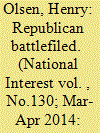

|
|
|
|
|
| Publication |
2014.
|
| Summary/Abstract |
THE COMMON wisdom holds that the GOP 2016 presidential race will boil down to a joust between the "establishment" and the "insurgents." The former will allegedly be more moderate and the latter more conservative. Since most polls for two decades have shown that around two-thirds to 70 percent of self-described Republicans call themselves conservative, this elite narrative will focus on just how much the establishment candidate will need to be pulled to the right in order to fend off his insurgent challenger.
|
|
|
|
|
|
|
|
|
|
|
|
|
|
|
|
| 4 |
ID:
120178
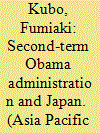

|
|
|
|
|
| Publication |
2013.
|
| Summary/Abstract |
The controversy in the Unites States on how to deal with the "fiscal cliff" revealed not just a deep ideological difference between the Democratic Party and the Republican Party but also a new sign of a possible crack of the conservative Republican ranks between those Republicans close to the Tea Party and those who favored the tax hike for the wealthy in order to save the tax cut for the rest of the people.
The planned deep cuts in the defense expenditure will have important implications for national security of Japan, which recently experiences increasing tension with China over the Senkaku Islands. The Obama Administration adopted a tough stance with China over the territorial issues in the South China Sea in July 2010. Rebalance to Asia could be understood, at least in part, to be a response to the rise of China, in a financial situation with fewer resources available for the national defense in the US.
The logical conclusion for Japan and the US would be for both of them to deepen security cooperation. Shinzo Abe, the new Prime Minister of Japan, should further clarify his foreign and national security policy priority and concentrate his efforts on strengthening the alliance with the US and building up the capabilities to defend Japan's territory, while exerting caution in jumping into "history" issues with China and South Korea so that Japan's message on the Senkaku Islands issue is crystal clear and focused: that it is against the established international norm to try to change the status quo by force or intimidation; this message should have universal appeal to a wider international community.
|
|
|
|
|
|
|
|
|
|
|
|
|
|
|
|
| 5 |
ID:
119671


|
|
|
|
|
| Publication |
2013.
|
| Summary/Abstract |
The Tea Party is a powerful new force in American domestic politics, but little is known about its supporters' views on foreign affairs. New survey data indicates that supporters of the Tea Party exhibit attitudes on international relations consistent with the Jacksonian tradition in American political thought but not, as some have maintained, isolationist opinions of the Jeffersonian variety. Jacksonians are supporters of a strong defense and a large military presence abroad and are opposed to Wilsonian global idealism. The article operationalizes support for these three different foreign policy traditions by connecting them to previous findings on the structure of American foreign policy. The effect of Tea Party affiliation on foreign policy attitudes is severely weakened, however, once we control for political ideology, particularly economic conservatism. As is the case in domestic politics, Tea Party sympathizers seem to be somewhat ordinary conservatives, not a completely new breed. There is a direct parallel between their domestic attitudes and their foreign policy attitudes. Their lack of support for idealistic policies abroad, their most prominent set of attitudes, is part and parcel of a lack of social solidarity indicated in their more economically libertarian position at home.
|
|
|
|
|
|
|
|
|
|
|
|
|
|
|
|
| 6 |
ID:
098635


|
|
|
| 7 |
ID:
101895
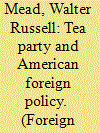

|
|
|
|
|
| Publication |
2011.
|
| Summary/Abstract |
What does rise of the Tea Party movement mean for U.S. foreign policy? Since today's populists have little interest in creating a liberal world order, U.S. policymakers will have to find some way to satisfy their angry domestic constituencies while also working effectively in the international arena.
|
|
|
|
|
|
|
|
|
|
|
|
|
|
|
|
| 8 |
ID:
105364
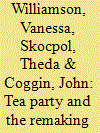

|
|
|
|
|
| Publication |
2011.
|
| Summary/Abstract |
In the aftermath of a potentially demoralizing 2008 electoral defeat, when the Republican Party seemed widely discredited, the emergence of the Tea Party provided conservative activists with a new identity funded by Republican business elites and reinforced by a network of conservative media sources. Untethered from recent GOP baggage and policy specifics, the Tea Party energized disgruntled white middle-class conservatives and garnered widespread attention, despite stagnant or declining favorability ratings among the general public. As participant observation and interviews with Massachusetts activists reveal, Tea Partiers are not monolithically hostile toward government; they distinguish between programs perceived as going to hard-working contributors to US society like themselves and "handouts" perceived as going to unworthy or freeloading people. During 2010, Tea Party activism reshaped many GOP primaries and enhanced voter turnout, but achieved a mixed record in the November general election. Activism may well continue to influence dynamics in Congress and GOP presidential primaries. Even if the Tea Party eventually subsides, it has undercut Obama's presidency, revitalized conservatism, and pulled the national Republican Party toward the far right.
|
|
|
|
|
|
|
|
|
|
|
|
|
|
|
|
| 9 |
ID:
132063
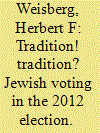

|
|
|
|
|
| Publication |
2014.
|
| Summary/Abstract |
The voting of Jews in the 2012 US presidential election is discussed in this article within the context of a recent reexamination of historical data on Jewish voting. Two Election-Night polls of Jews and the largest scientific survey of Jews to date make this detailed exploration of Jewish voting possible. Voting differences among Jews are analyzed, especially among major denominational movements. The role of American policy on the Middle East merits specific attention, particularly given concern about the potential Iranian nuclear threat to Israel. Explanations of Jewish liberalness and Democratic identification are considered, with a special focus on the role of social identity. A reluctance of Jewish conservatives to identify as Republicans is discussed as well as how Jewish conservatives react to economic and social issues. The possibility of a party realignment of Jews along generational and denominational lines is considered, as well as the impact of the Republican alliance with Evangelical Christians and the Tea Party.
|
|
|
|
|
|
|
|
|
|
|
|
|
|
|
|
| 10 |
ID:
102132


|
|
|
|
|
| Publication |
2011.
|
| Summary/Abstract |
This essay's approach to race and the Tea Party is twofold: to consider the role race plays in Tea Partiers' claim that they have "lost their country" and to question why blacks would be members of the Tea Party given its radically conservative views. To explore the latter, Walker looks to black and other minority conservatives from the past who embraced political conservatism as a means to escape stigmatization. Walker's essay argues that America has become less racist than it used to be, but he resists characterizing the nation as "post-racial." He uses examples of conflicts between Asians, blacks, and Mexicans to further his point.
|
|
|
|
|
|
|
|
|
|
|
|
|
|
|
|
| 11 |
ID:
116470
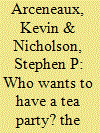

|
|
|
|
|
| Publication |
2012.
|
| Summary/Abstract |
In the wake of the 2008 election, disgruntled conservatives organized opposition to President Obama's policies under a new movement dubbed the Tea Party. As an emerging force in American politics, we seek to understand who supports the Tea Party and the political attitudes these individuals hold. Using a nationally representative survey of respondents during the 2010 midterm elections, we examine whether the emerging narrative surrounding the Tea Party is accurate. The survey included a novel embedded experiment designed to investigate claims that animosity toward racial minorities drives Tea Party opposition to welfare. We find support for the contention that the Tea Party is predominately white, male, conservative, and strongly opposed to tax increases. Tea Party supporters, however, are not simply libertarians. In spite of appeals to freedom and liberty common in Tea Party rhetoric, a strong authoritarian pulse exists among its most ardent supporters. Furthermore, although we find evidence that racial resentment colors Tea Party members' judgments about government aid to the poor, racial animus does not appear to be the primary force behind their opposition to government aid. Lastly, we uncover some evidence of heterogeneity within the movement, with a small minority of Tea Party supporters voicing less-extreme political attitudes and evincing a rejection of negative racial stereotypes.
|
|
|
|
|
|
|
|
|
|
|
|
|
|
|
|
|
|
|
|
|